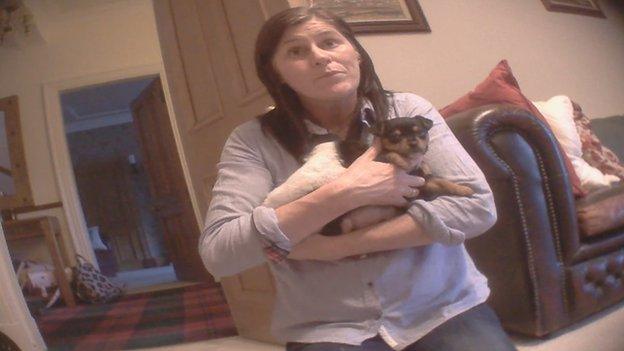Exposing the illegal side of the dog trade
- Published
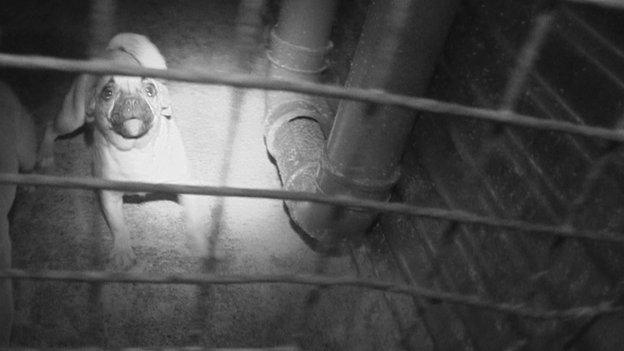
The BBC Scotland team filmed after dark at Furnish Kennels in Northern Ireland
For the past six months I have investigated the UK's dog trade, from the legitimate to the downright criminal. From small-time sellers to profit-driven puppy farmers.
I knew that the trade was huge, worth hundreds of millions of pounds in the UK. But seeing the scale of it all at close quarters was an eye-opener.
My investigation has allowed me to see things I never thought I'd see, including cruelty to a companion animal that used to be considered man's best friend.
I wanted to know who those behind the illegal side of the trade were. How did they operate and how much money was being generated?
At the bottom end of the scale I discovered a woman called Liz Baird, a notorious dealer in the puppy industry.
She's been investigated, prosecuted, even banned from selling in the past. But, as I was to find out, this hadn't stopped her.
Different identities
Undercover reporter Sam Poling arranges a meeting with a puppy seller for the BBC documentary - Dog factory. "Everything about that meeting was wrong," she says.
I found her advertising pups online. Oddly, she seemed to be using a number of different identities: "Susan", "Anne", "Linda" and even the name "Milo Reeves".
We answered one of her ads. True to form, she'd arranged to meet us in the quietest part of the car park to make the deal. I turned up to meet her. It took only 45 seconds before she was ready to hand me the puppy and take my £395.
There were no questions asked about my suitability for looking after a puppy. I was also told I'd be given no paperwork, and that she'd given the pup a herbal remedy called Parvaid, rather than having it vaccinated.
When I asked about whether the pup should be vaccinated, Ms Baird told me: "If you want to go down the technical, like the vet route, then you can, but she's covered."
This goes against all the best advice and is at odds with the view of bodies like the British Veterinary Association.
I decide not to buy the pup and Ms Baird leaves, annoyed. But the experience has given me an insight into why people part with their money in similar circumstances.
Had I been interested in buying a puppy it's likely I would have handed over hundreds of pounds because it's such an emotional purchase.
The animal welfare charity, the Scottish SPCA, is at the frontline of dealing with those at the heart of the illegal trade.
Cash only
I met with an undercover investigator, the SSPCA's head of its Specialist Investigations Unit, a man whose job it is to target those making a killing on the back of the ruthless industry. He tells me how lucrative the industry is for the criminals.
"Pups are sold wholesale for somewhere in the region of £150," he tells me.
"The more dogs you buy, the cheaper you get them. You bring them across to Scotland and you sell them…in excess from £300-£750 depending on the breed you want. If you go for the more specialist breeds, for instance French Bulldogs, it can be £1,500.
"It is all cash. People buy in cash. No-one buys a pup other than cash."
I went online again and spotted more ads, dozens of them with the same or similar wording.
I tracked the seller to an address in the affluent west end of Hamilton, the home of Brian and Bernadette O'Neill. It's clear they're selling a lot of pups, all different breeds. I arranged to see one of the pups, and was told they'd come from a small breeder in West Kilbride.
There's only one problem, though. I've checked, and I know there are no licensed breeders there.
The O'Neills obviously have a ready supply of dogs, but why would they lie? When I investigated further the answer becomes clear.
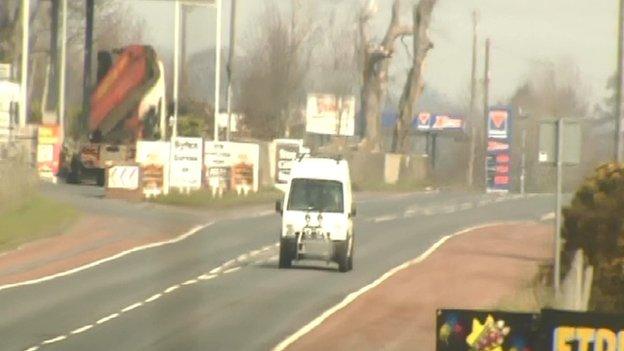
Mr O'Neill was secretly filmed getting puppies from the Republic of Ireland and illegally trafficking them
Over the course of several months, I secretly filmed Mr O'Neill getting his puppies from the Republic of Ireland and illegally trafficking them into Northern Ireland, and then into Scotland through Belfast Ferry Port.
The pups Mr O'Neill is bringing into the UK should have pet passports, microchips and a rabies vaccination. They have none of these, breaching legislation set up to protect young pups and to defend the UK from rabies.
I caught up with Mr O'Neill on one of his buying trips in Ireland. I wanted to ask him about his illegal dog trafficking business. He had nothing to say, and instead shoved me out of his way. He drove off, covering his face with a cushion.
Mr O'Neill might not have had anything to say, but what he'd done was open my eyes to a major transport route used by puppy traders who sell their goods in Scotland.
Reporter Sam Poling confronts dog trafficker Brian O'Neill
In Northern Ireland I discovered another side of the puppy industry - one that's legal, but on a scale many experts did not believe existed in the UK. I found a place called Furnish Kennels in Fermanagh, run by two brothers who between them have licences to keep more than 500 breeding bitches on the site.
I tracked down a man called David Bailey, a former government vet who was employed by the Hamiltons at the same time for almost three years from 2007. He told me he'd never seen a place on such a scale.
He told me he wanted a log kept of all the dogs, but said that David Hamilton was reluctant to keep these records.
"I had my suspicions why he didn't want me or others to know the numbers of animals that he had," he said.
"The suspicions being what?" I asked him.
"So the suspicion being that he didn't want, he didn't want it publicised or made clear to anyone for any reason that maybe a bitch was being bred from three or four times a year, the number of deaths of puppies that were dying was unacceptably high."
He told me the dogs "got a dunking once a week" in a "heavy duty" substance to control mange in pigs. And that, later, David Hamilton applied to the police for a handgun licence to shoot his dogs.
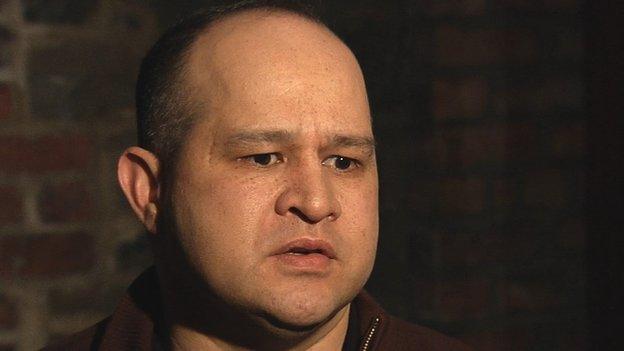
According to vet David Bailey, David Hamilton was reluctant to keep records of all the dogs at Furnish Kennels
Everything I'd heard from Mr Bailey and the SSPCA pointed to Furnish Kennels operating like a factory. A dog factory. But I wanted to capture it on camera.
With the kennels closed to outside guests, I had to choose the timing of my visit there very carefully. I went in at 02:00 and filmed at night. It was so dark I had to switch the camera to night vision.
What I found astounded me. When I arrived at the kennels, the noise was deafening. I found two large sheds and hundreds of dogs. There was row upon row of cages. The scale was unimaginable.

Sam Poling said the noise inside the Furnish Kennels at night was "deafening"
Something caught my eye in each of the cages: plastic pipes with a hollow trough at the bottom. An automatic feeding system.
The pipes are filled with food, which drop down whenever the trough becomes empty. Similar to ones used in battery farming. It's a labour-saving device, and reduces the need for human contact.
Across the yard from the mums I found a row of what look like old, disused trailers. It was freezing and there was snow on the ground, yet inside I could hear whimpering.
Inside, I found the pups, just weeks old. Huddled together without their mums. Just pups. Dozens of them, and in another trailer there are more puppies.
It's a licensed business and I struggle to see how the legislation allows a place like this.
I showed my footage to a panel of experts, including Dr John Bradshaw of the University of Bristol.
"All that noise going on, those dogs are going to be deafened," he says. "Because dogs have very sensitive hearing."
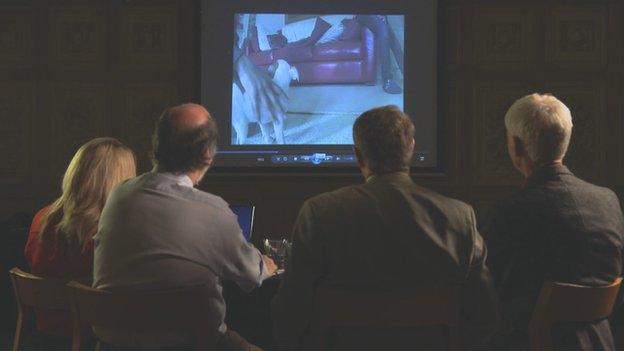
A panel of experts was shown footage of BBC footage from Furnish Kennels
Harry Haworth, a vet and director of the SSPCA adds: "And I presume the feeding system is there, so this just reduces the contact with humans even more really. I mean these dogs are not going to be well socialised dogs, they're not going to look on humans as being their source of food."
Mike Radford, a reader in Animal Welfare Law at the University of Aberdeen, says: "It seems to me just looking at it, that this is a lower standard than would be required of agricultural animals in an intensive system."
Dr Bradshaw adds: "It's an extraordinary and abhorrent mixture of the worst of factory farming and dog breeding. It's quite horrendous."
In a statement through his solicitor, David Hamilton told us that his "premises are maintained and run in accordance with all relevant legislation and regulations in an entirely open and transparent manner. All dogs are under the supervision of a nominated veterinary surgeon. All recognised protocols are in place."
We contacted the council responsible for the inspections of Furnish Kennels. They told us the kennels were now called the UK Dog Breeding Academy.
They inspected the premises four weeks ago and "found no evidence of mortality…no puppies were found to be kept in trailers on site".
It was their opinion that "the premises are kept in very good condition" and complied with legislation.
If there's one thing I'd learned from my investigation - looking at the illegal side and the licensed puppy trade - it's that we, the buying public, have as much a responsibility as the breeders and the sellers.
If, when buying a puppy, we did it with our heads rather than our hearts, perhaps the trade wouldn't be as profitable for those abusing not just the system but those at the centre of it all - the dogs.
The Dog Factory will be broadcast at 21:00 on Wednesday 15 April on BBC One Scotland, and BBC One Northern Ireland.
- Published15 April 2015
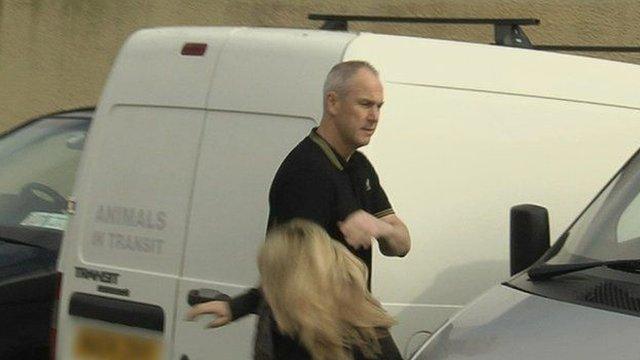
- Published15 April 2015
